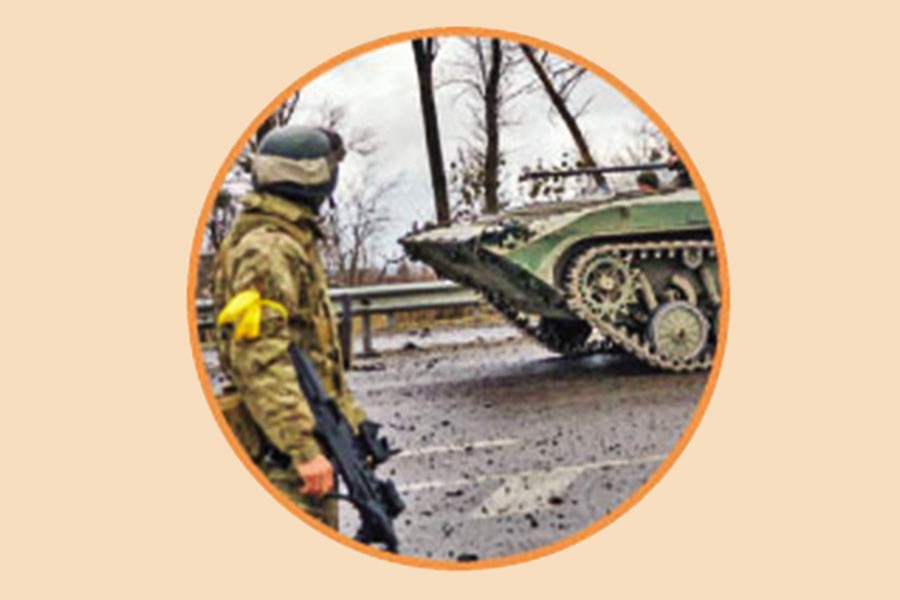The government has a double whammy on its hands neither of its choosing. The first equation was about re-starting the economy while balancing the massive number of those that went from being middle-class to the poverty level. By any stretch of imagination this is a daunting one given the change to human psyche post-pandemic. A new normal has emerged from the ashes further exacerbated by the war in Europe. The political decision not to condemn an act of aggression against an independent country is one that must have weighed heavily on Prime Minister Sheikh Hasina. In a sudden polarisation Bangladesh finds itself in the same bracket as Pakistan, India, China and thirty-two other countries that didn't feel the need for a condemnation. Politics, geo-politics and economic considerations have prevailed.
The sweeping sanctions on Russia led by the West seeks to weaken Russia economically in order to wean it away from adventurism. The stake in the sand of not engaging militarily has told us all we need to know. The much flaunted premise of sovereignty, as has been known, will be redefined. Extricating from the debate on the ambition led politics, the economic consequences are unravelling faster disclosing all that we didn't want to know. From energy to food grains, the story isn't a pretty one. Europe is figuring out a way of reducing its one third dependence on Russian energy from elsewhere. That 'elsewhere' probably being the United States means a further shift of 'independence' to others' arms. Having tried and failed to get Vladimir Putin, Emmanuel Macron has focused on a possible famine ahead. Whatever the outcome in Europe, the conflict has aggravated the already fragile future food grain situation. Macron's attempt at cobbling together some consensus comes in the face of major shortages. The Food and Agriculture Organisation had forecast close to a decade ago that current practices of the time would be unable to meet world requirements. Those 'practices' included squeezing of agri land in favour of settlements and over-cropping, thereby reducing soil fertility. Famine like conditions exist in Sub-Saharan Africa, Yemen, Sudan and Afghanistan more due to conflict and politics.
Countries that state self-sufficiency, like Bangladesh is finding out that that aspect can be undermined by increased costs of imports of other products, thereby impacting prices. Top
that up with gross profiteering that the government can't or won't go after and you have the sorry sight of people running after fair-price selling products where the queues get longer. Hands have been forced. Duties and VAT has been removed from some of the most sensitive items leaving the taxman in a dilemma on where the growth portion of revenue is to come from. Remittances have shown an alarming decline that will no doubt quiver in the coming days till the dust settles between conflict and sanctions. At stake is half a billion dollars garments exports to Russia and the bulk to Europe coming under strain.
Recent years' budgets have buoyed on increased revenues, remittances and exports. This scenario may change rapidly if the Europe is hit by an additional £ 400 in energy cost per family and a projected 15% price rise of essentials. Drawing an additional 30 million out of the grip of poverty isn't easy. Keeping prices stable is doubly difficult. Minister after minister has thrown up their arms admitting defeat in finding answers. Hedge funding is a time-tried business tool to ensure certainty of prices. Two-year advance orders of gas,fuel, essential commodities and spices at mid-range pricing is an area of consideration even if it means political polarity extremes. The Prime Minister had long ago wanted Bangladesh to contract farm abroad with shared crop harvests. Sudan has reignited the possibility by offering land in exchange for technology, seeds, fertiliser and manpower. That ensures government silos aren't short of grain, reduces dependence on traders and allows for appropriate prices. Much as subsidies are frowned upon the government may have little choice in either sops or subsidies to prevent more from going under. Flat slabs in taxation often played with but never implemented may be a reality not to be ignored any further.
The Food Minister is puzzling over high prices of rice given stocks in godowns. Consumer Rights inspectors found no shortage of edible oil with the producers. It's the markets where the truth actually comes out. Forcing consumers to buy other products along with edible oil is a telling phenomenon. Reluctance to issue receipts for loose sale of edible oil is another indicator. There's quite a few things rotten in this kingdom of ours.


